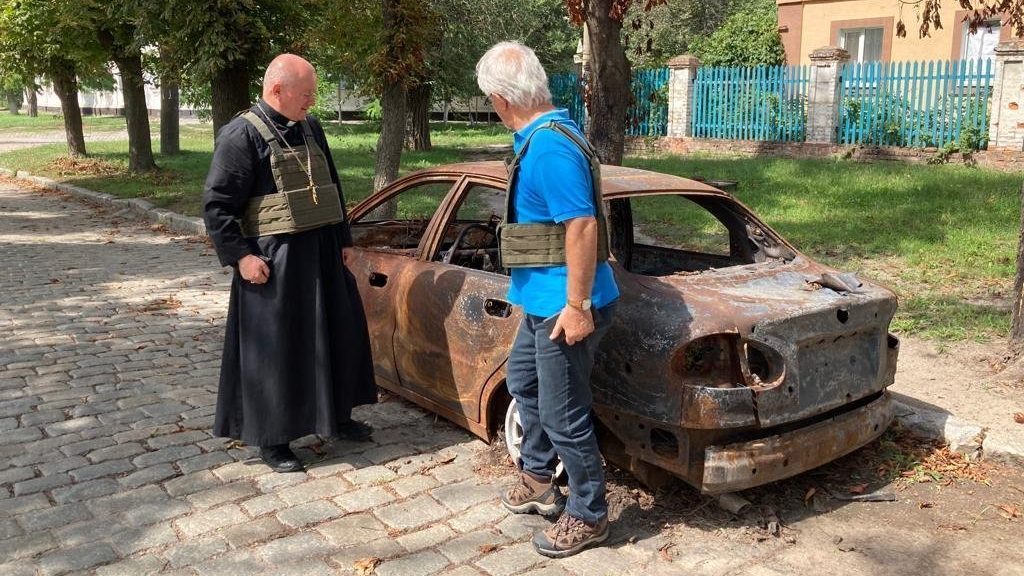Ukrainian religious leaders have rejected demands for Russia's Orthodox Church and language to be guaranteed official status in their country, although a Catholic bishop also warned against a threatened crackdown on Orthodox communities.
The Russian Orthodox Church "directly participates in the war against Ukraine, has openly proclaimed as its mission the destruction of Ukrainian sovereignty, culture, and national identity," Ukraine's Council of Churches and Religious Organizations, or UCCRO, said in an Aug. 17 declaration.
The council expressed its "support for the Ukrainian state in defending Ukraine's legitimate interests at the international level and in building relations with other states based on the principle of 'reciprocity.' Ukraine must not be forced into 'asymmetric' obligations concerning the special status of the Russian language, culture, the Russian Orthodox Church, or participation in international organizations," the statement read.
The council, which includes Orthodox, Protestant, Catholic, Jewish and Muslim leaders, was reacting to media reports that Russia's Vladimir Putin had demanded the guarantees during his Aug. 15 Alaska summit with U.S. President Donald Trump.
It said several European countries had imposed restrictions on the Russian church because of its "destructive activities," adding that Putin would naturally defend its "interests on the international stage," as "a Russian state institution, fully integrated into the Kremlin's aggressive political system."
However, a Catholic bishop warned that many parts of eastern Ukraine remained Russian-speaking, like they were prior to the 2022 full-scale Russian invasion, with most Christians belonging to Ukraine's Moscow-linked Orthodox Church, or UOC.
"With people suffering and dying on both sides, we're happy diplomatic steps are underway to end this war -- and praying God may even draw Putin towards good thoughts in this direction," Auxiliary Bishop Jan Sobilo of Kharkiv-Zaporizhzhia, Ukraine, told OSV News.
"In these conditions, we shouldn't act as Russia has previously done, in barring Catholic and Protestant pastors from its occupied territories," he said. "Political interference in religious matters is never a good move."
The exchanges took place as European heads of government held further online consultations after accompanying Ukrainian President Volodymyr Zelenskyy to Aug. 18 talks in Washington with Trump, three days after the U.S. leader's summit with Putin.
Meanwhile, media reports said Trump was now seeking direct talks between Putin and Zelenskyy following the White House meeting, which was accompanied by new mass Russian drone and missile attacks on Ukraine.
Among reactions to the top-level talks, the pope requested prayers in his Aug. 17 Angelus message that efforts "to promote peace may bear fruit" and that "the common good of peoples" would "always be placed first."
Meanwhile, the Geneva-based World Council of Churches said it also hoped current initiatives would lead away from "the path of aggression," and it called on its 356 churches member-denominations from over 120 countries to support UCCRO's appeal for a World Day of Prayer on Aug. 24, the anniversary of Ukraine's post-Soviet independence.
With over a hundred of its priests and bishops convicted or accused of treason during the war, the pro-Russian UOC was given until Aug. 18 by the Kyiv authorities to prove it had severed ties with Russia's Moscow Patriarchate as a condition for continuing to function.
In an Aug. 16 letter, however, the UOC's leader, Metropolitan Onufriy (Berezovsky), said his church would not now comply with the deadline's "fictitious" requirements, adding that Ukrainians officials were acting in "gross interference" in its internal affairs and lacked necessary expertise to investigate its Moscow connections.
This was rejected by the Council of Churches and Religious Organizations, which said the relevant law, enacted in August 2024, had been necessitated by Russian Orthodox actions, including Patriarch Kirill's declaration of a "holy war" against Ukraine.
UCCRO added that the law did not prohibit the UOC, but merely established "democratic and legal procedures" for suing church communities which retained links with Russia.
"The Russian state, both on its own territory and even more so in the occupied Ukrainian territories, systematically disregards and violates all fundamental principles of religious freedom, as documented in numerous reports," the council said in its declaration.
In his OSV News interview, Bishop Sobilo said it was up to Ukraine's security services to ensure members of the Moscow-linked UOC were not "spreading anti-Ukrainian propaganda."
However, he added that his own Catholic Church maintained a position "above national divisions," and was "historically uneasy" about banning religious communities.
"The Council of Churches has declared its position clearly -- but it's a coordinating body, with no canonical or decision-making authority over individual churches," the Zaporizhzhia-based bishop told OSV News.
"We're a democracy, upholding freedom of speech and faith, and it's important that every religious community feels at home in Ukraine. Restricting religious rights could damage our country's image at a critical time and impede an end to this war by alienating the many clergy and faithful who are directly affected."

